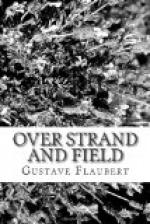Young boys came out of the water, and, stepping gingerly on the pebbles, ran up the beach to dress. When they attempted to put on their shirts, the moist linen clung to their wet shoulders and we could see their white torsos wriggling with impatience, while their heads and arms remained concealed and the sleeves flapped in the wind like flags.
A man with his wet hair falling straight around his neck, passed in front of us. His dripping body shone. Drops trickled from his dark, curly beard, and he shook his head so as to let the water run out of his locks. His broad chest was parted by a stubby growth of hair that extended between his powerful muscles. It heaved with the exertion of swimming and imparted an even motion to his flat abdomen, which was as smooth as ivory where it joined the hips. His muscular thighs were set above slender knees and fine legs ending in arched feet, with short heels and spread toes. He walked slowly over the beach.
How beautiful is the human form when it appears in its original freedom, as it was created in the first day of the world! But where are we to find it, masked as it is and condemned never to reappear. That great word, Nature, which humanity has repeated sometimes with idolatry and sometimes with fear, which philosophers have sounded and poets have sung, how it is being lost and forgotten! If there are still here and there in the world, far from the pushing crowd, some hearts which are tormented by the constant search of beauty, and forever feeling the hopeless need of expressing what cannot be expressed and doing what can only be dreamed, it is to Nature, as to the home of the ideal, that they must turn. But how can they? By what magic will they be able to do so? Man has cut down the forests, has conquered the seas, and the clouds that hover over the cities are produced by the smoke that rises from the chimneys. But, say others, do not his mission and his glory consist in going forward and attacking the work of God, and encroaching upon it? Man denies His work, he ruins it, crushes it, even in his own body, of which he is ashamed and which he conceals like a crime.
Man having thus become the rarest and most difficult thing in the world to know (I am not speaking of his heart, O moralists!), it follows that the artist ignores his shape as well as the qualities that render it beautiful. Where is the poet, nowadays, even amongst the most brilliant, who knows what a woman is like? Where could the poor fellow ever have seen any? What has he ever been able to learn about them in the salons; could he see through the corset and the crinoline?
Better than all the rhetoric in the world, the plastic art teaches those who study it the gradation of proportions, the fusion of planes, in a word, harmony. The ancient races, through the very fact of their existence, left the mark of their noble attitudes and pure blood on the works of the masters. In Juvenal, I can hear confusedly the death-rattles of the gladiators; Tacitus has sentences that resemble the drapery of a laticlave, and some of Horace’s verses are like the body of a Greek slave, with supple undulations, and short and long syllables that sound like crotala.




